
There are many benefits to having a spouse tag along on business travel and with more professionals able to work remotely, it’s become easier to do. Not only is it a nice perk for your spouse, it’s something that employers should encourage in the interests of the health and wellbeing of their workers.
Frequent Business Travel is Hard
There’s no question that travelling a lot for business takes its toll. It’s stressful even if you’re an old hand at it. Constantly contending with airport security, crowded flights, and changing time zones quickly dispels any glamorous jet setting fantasies. Add to that the difficulties of eating nutritiously in restaurants and getting regular exercise, and it’s easy to see why road warriors are generally less healthy than their home bound counterparts.
If you and your spouse are constantly apart, business travel delivers a psychological hit too. Separation a few times a year for a week or two is manageable, but if you’re finding yourself in an airport departure lounge a couple times a month that’s another story.
Having your spouse tag along at least some of the time can go a long way to easing the relationship strain and can be an added help managing the other challenges that come with business travel too. As the tag-along spouse, I have a long list of benefits on my side of the equation as well.
Almost like home
When I tag along on my husband Steve’s business travel, it’s usually worthwhile to rent an apartment. This allows me to set up my own comfortable remote work station and it comes with a kitchen. We usually choose a property in a residential neighbourhood. Instantly, we’ve replicated some of the comforts of home. Steve isn’t ending his long days with clients by coming back to a cramped hotel room with a bag of take out food. I can pop out to a grocery store during the day and we can cook a simple meal together, which is always vastly healthier. Because we’re in a neighbourhood, it’s easier to get out and take a walk in the evening, or get up a bit earlier and go for a run. Activity is also always easier with a companion.
It’s less lonely
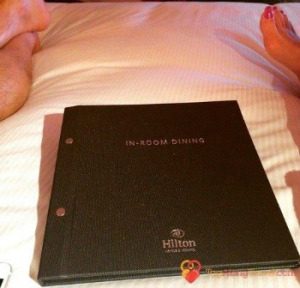
Skype calls and instant messaging go a long way to keeping spouses separated by business travel in touch, but it doesn’t replace actually being together. Even if Steve is working long hours, if I tag along there is always time at the end of the day to talk and we’re at least sleeping in the same bed. This helps to maintain the relationship and eases the psychological strain of being separated from home and loved ones
When time allows, you can sightsee together or go out to a nice restaurant in the evenings. Although business travel isn’t like being on vacation, it’s a change of scene and can still be fun. We don’t have children, but if you do and can swing a tag-along trip without them, it’s a great opportunity to connect as a couple without the demands of childcare.
It can jumpstart a holiday and cut costs
A huge perk of taking your spouse along on business travel is that you only have to pay for one flight to get there. If you’re a frequent business flyer, you can usually use points to further reduce the cost. It’s a perfect opportunity to tack on some vacation time either in the location you’re visiting or somewhere else close by. Even if you’re not travelling to a destination you’d necessarily choose to visit on your own, don’t rule it out as a short vacation spot. There are several low-expectation places I’ve tagged along to that turned out to be absolute gems.
Employers benefit too
I can’t imagine why an employer would not encourage their employees to take their spouses with them on business travel. At the very least, they shouldn’t discourage it. Yet I sometimes get asked about overcoming an employer’s objection to spouse tag-alongs. Is it a concern about the employee not working full hours because the spouse is with them or that they are claiming expenses for the spouse’s travel? Those are the only two reasons I can think of and neither is a reasonable concern as far as I can see.
Every business that includes employee travel should have a travel expense policy. If you have an established per diem for meals and require receipts, that aspect is taken care of. As far as employee time spent on work, you either trust your employees or you don’t. As long as productivity and business goals are met, what does it matter how many hours your employee is putting in?
In my experience, Steve tends to work longer hours when on business travel then at home and I bet that’s a common experience. We’re careful about keeping my food expenses separate from his. As for lodging, the cost of two people staying in a hotel or apartment is generally the same as for one.
So, am I missing something? What’s the downside?
I think that savvy employers know that there is a burden associated with staff having to travel frequently. Recruiting and retaining exceptional people is not easy and retaining their loyalty is just as difficult. Add the work requirement of frequent travel and you’ve really got your work cut out for you finding great workers. Making it easy for them to have their spouse tag along and going as far as having policies that encourage it could provide a slight edge.

Deborah Zanke writes the blog Tag Along Travel where she offers advice, tips, and travel reviews based on the experience of more than a decade of her husband Steve’s frequent business travel.
Further Reading

Colombia is a country very much overlooked by female travellers but the majority of the country is surprisingly safe for women.
Medellin, Colombia’s second largest city is fast becoming known as the “Silicon Valley” of Latin America due to its entrepreneurship, start-up companies and work ethic. Being part of Latin America, it is still a very machismo society but you’ll find women dressed up in Medellin, wearing skinny jeans and tight clothing so there’s no need to worry about attracting the wrong type of attention or feeling that you will stick out for dressing for your curves. The city has come a long way in the last decade and is now a safe place to visit and do business.
Colombians are very polite and tend to stand close to one another, so don’t worry if they sit or stand too close. It’s just part of their culture. They are also very expressive and wave their arms and hands around. Colombian women are known for expressing their emotions whenever they arise so you’ll always know where you stand even in a meeting.
Communication
Although Spanish is the main language here, many Colombians can also speak English. However addressing them in Spanish is polite, as well as by their title or by Señor or Señora until they tell you to call them by their first name. Most women greet each other with a kiss on the cheek but if you are doing business with men greet with a handshake unless they greet you with a kiss first.
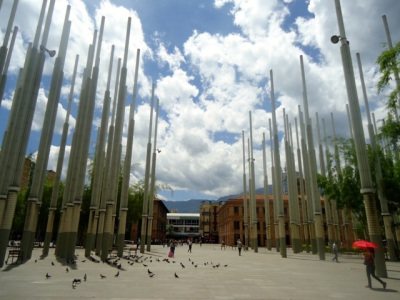
Colombians can be similar to us Brits by not being so direct in their communication to avoid offending the other person. However, when it comes to negotiating they expect honesty when talking about prices and figures. Make sure that you speak to the correct person or you could find yourself going round in circles if you don’t liaise with the decision maker.
Although Colombians don’t expect others to be late during business, they are not known for being punctual, especially the women who can take hours to get ready. Being over 30 minutes late is acceptable for them and they may not issue an apology so it is advisable to call them before you leave to meet instead of waiting around.
Colombians love to talk so expect them to ask you about you and find out more before delving into business. Don’t expect meetings to finish on time and a decision to be made in just one meeting either as you may need to meet several times to get the ball rolling. Make sure that you end each meeting by asking what they are doing this coming weekend or asking about their family. Colombians are proud people and like people who take an interest in their country and them as a person.
Culture
Colombians are really proud of their country and especially if they are a ‘paisa’ and come from the Antioquia region of which Medellin is the capital. Although the country is still very machismo, the men have old-fashioned values and don’t look down on women, instead preferring to look after them and open doors and buy drinks to ensure they are comfortable and looked after. Women here either look after a family or are well-educated with a degree and in good paying jobs.
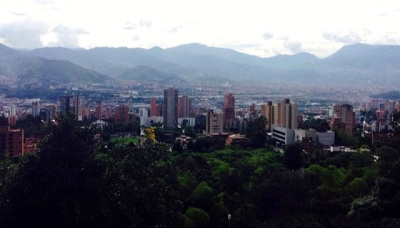
Dress
The key to business in Medellin is to dress to impress, and embrace your femininity. Jeans and casual wear is a no go. Ladies tend to stay away from trousers and wear skirts or dresses but avoid short skirts and opt for a pencil skirt instead. Women in Medellin dress immaculately with straight styled hair, perfect make-up and plenty of jewellery with manicured nails and high heels.
Outside of business, expect to be asked to dance by a Colombian man if you are out socially, and most of the time it is only a dance that is requested. If you do get approached and don’t want to dance, just say no. Colombian men are known for having a wife, a girlfriend and a lover and can be very charming. Infidelity is common here and even the women do it although it is as much as the men. You won’t see any Colombian women acting drunk on nights out either as it isn’t acceptable to be intoxicated.
Colombians are very easy-going people and it is easy for acquaintances to become firm friends here.
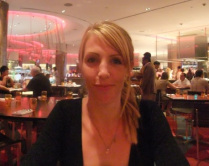
Lisa is a travel journalist specialising in solo travel. Her background in the travel industry fuelled her passion to see the world and for the last seventeen years, she has travelled extensively as a solo traveller, living and working in numerous countries. Follow her on Twitter at @girlaboutglobe
Further Reading

Doing business in Mongolia can be both challenging and very rewarding at the same time. Adapting to the way of life here can take time. In Mongolia, things may not run on time or as smoothly as you are used to in the Western world.
Differences
Mongolia is called the Land of The Blue Sky and has a harsh climate with temperatures as low as minus 30 degrees Celsius in the winter months and plus 30 degrees in the summer months. Be prepared for the culture shock. It may look like a modern capital but the city is also one of the world’s most polluted cities with a lot of dust in the summer.
Walking around the capital you could be fooled into thinking you were in a modern European city with expensive designer stores and swanky bars but it really isn’t like other capital cities. There is a lack of order and structure. Every summer there is a shortage of hot water and you can go for weeks without, except in the more expensive hotels, and the amenities aren’t to the same standard that you would find in other places in Asia. The diet is also heavier and the country isn’t that great for vegetarians, as meat is the staple diet.
There is a divide in the capital and a contrast between the middle class and working class. The office workers live in apartment buildings and the poorer people live within the ger district on the city outskirts without proper amenities. Be prepared to see some drunken locals as Mongols like their vodka and typically drink it straight, so you may see a few stumbling around the streets during the day.
Knowing a few phrases of the language really helps to get by. Not many people speak English here, with some speaking Russian. Mongolian can be a difficult language to learn but smiling and body language is definitely universal here.
Doing Business Here
Although doing business here is more flexible and relaxed than the UK, there appears to be a lack of order and structure within the workplace and the city itself.
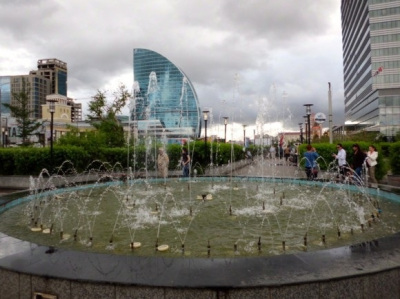
Mongolian’s can be wary of westerners and can take time to trust you before they accept you into their group. Mongols tend to be very direct so it’s best to always look people in the eye when speaking to them. The person who called the meeting is the one who should start the discussion and keep things moving forward. When greeting others, a handshake is enough with no other physical contact, as people generally just say “Hello.”
Mongolians expect other nationalities to adapt to their way of doing things so don’t expect meetings to start on time as it is not considered rude to be late. People tend to show up when they are ready and are scheduled to a particular time, and even transport runs later here.
Dress
Mongolian women are so stylish and you’ll often see them walking around wearing tight dresses even during the day. For business wear either a mid-length skirt or a suit with a blouse to look more professional than those choosing to wear tight dresses. Hand over your business card with either your right hand or both hands, and receive either with the right hand or both.
Wear good comfortable working shoes as the roads are crumbling and often just dug up and left so high heels aren’t recommended.
Westerners in Mongolia
There aren’t many westerners in Ulan Bator and the tourists that come generally spend more time in the rest of the country exploring the landscapes. The younger generation are more westernised and open to other nationalities so with their international experience Ulan Bator will become a more comfortable environment for tourists and business people.
There are a lot of Expat places if you are looking to meet others during your stay. A great networking place is Henneseys – the owner is good at connecting people. The Blue Sky Hotel & Tower is also a great place to meet others and is one of the nicest places in the city. There’s entertainment in the form of karaoke but it is very limited unless you enjoy bars.
Flagging down a taxi isn’t necessarily that safe as anyone in a car can collect you and charge you a fare. For safety, there is now an English speaking taxi firm that you can call called Help Taxi +976 9965 2371.
Although doing business in Mongolia can be somewhat challenging, it is definitely an experience.

Lisa Eldridge is a travel journalist specialising in solo travel. Her background in the travel industry fuelled her passion to see the world and for the last seventeen years, she has travelled extensively as a solo traveller, living and working in numerous countries. Follow her on Twitter at @girlaboutglobe